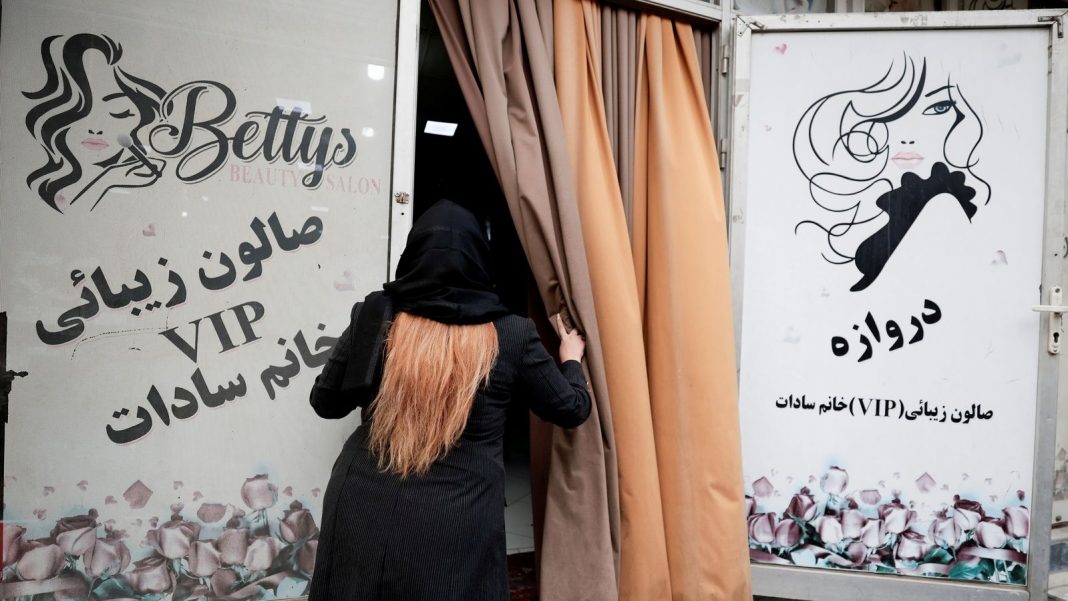As I stepped into my local beauty salon here in England to have my nails done ahead of my brother’s wedding, my phone pinged.
It was a catch-up message from a 23-year-old Afghan woman I have stayed in touch with since we met in Kabul last year.
The irony of the timing of her message wasn’t lost on me.
I had been thinking about her and the other young women from Afghanistan I’ve met in the last few years, when the Taliban ordered all beauty salons in Afghanistan to be shut.
“Salons, gyms, universities, baths, it is all just an excuse,” she wrote, “they just want to destroy us, either to be their slaves like their mothers, or be killed.”
When we first met in August 2022, one year after the Taliban’s takeover, she was already afraid of what would come. So afraid that she didn’t want her name or face published – not then and not now.
She and other women we spoke to likened their lives to “being in prison” almost every day, being told what to wear, what to say, and what to do by the Taliban’s ‘morality police’.
The one place, though, they all knew they could catch a break was inside their beauty salons.
They were another world altogether.
The salons allowed women to cast off many of the shackles of public life
When I was working in Kabul last year, I visited one of these salons along with a female journalist friend of mine. No men are allowed inside.
We wanted to see whether the salons were still operating as usual, and we actually just wanted to be in a space where women aren’t judged or vilified just for being a woman.
Mostly dark, thick, ‘inoffensive’ curtains separated the salons from the streets – though some went for bold-coloured curtains, and I liked that, it felt like a small act of rebellion.
Painted nails and skinny jeans
Once women entered those curtains, for a moment they were free.
They were free to take off their black abayas and niqabs and store them in a cupboard and instead walk around in skinny jeans and a ‘nice top’.
They were free to have their nails painted in bright yellows, oranges, and pinks on the toes they aren’t supposed to show.
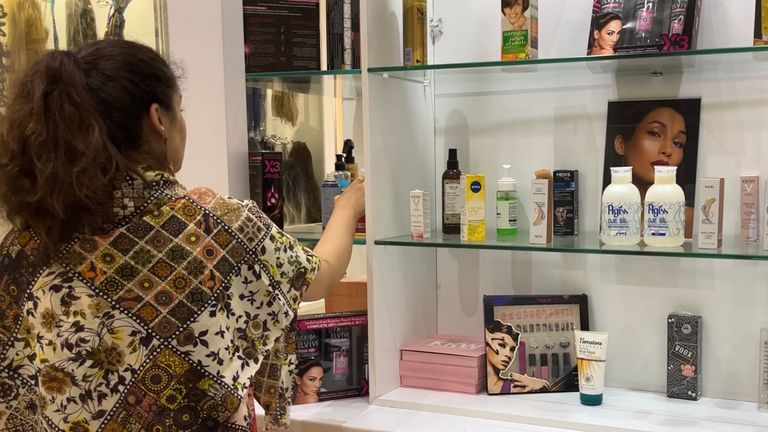
The owner we spoke to (above) always feared the Taliban would force salons to close
And they were free to say anything they wanted to say while they chatted away and exchanged news as their hair was being cut, coloured, and blow-dried.
One group of young women were gathered in a corner of the two-storey salon getting ready for a family wedding.
They were wearing traditional, colourful Kuchi dresses and ornate jewellery and headwear, with sparkly high heels.
They looked stunning, but they couldn’t show their faces because they didn’t want to get in trouble.
The salon’s owner, a feisty woman full of confidence and positive energy, was happy to talk as she managed her staff and dozens of clients.
She insisted she didn’t want to cover her face for the interview, she wanted to speak openly, though she didn’t want her or her salon’s name published – just in case.
At the time, she talked about the tense relationship between her salon and the morality police.
“The Taliban holds all the power, they could close my business at any time,” she said matter-of-factly. But she hoped it wouldn’t come to that.
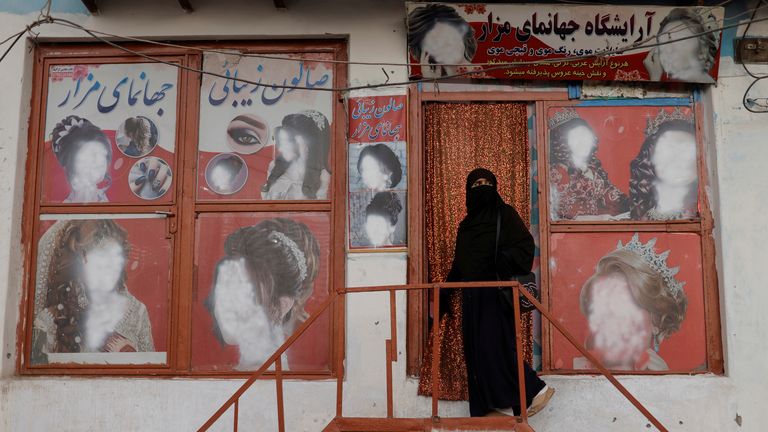
Some salons had images of women defaced, others chose to remove them when the Taliban took over (below)
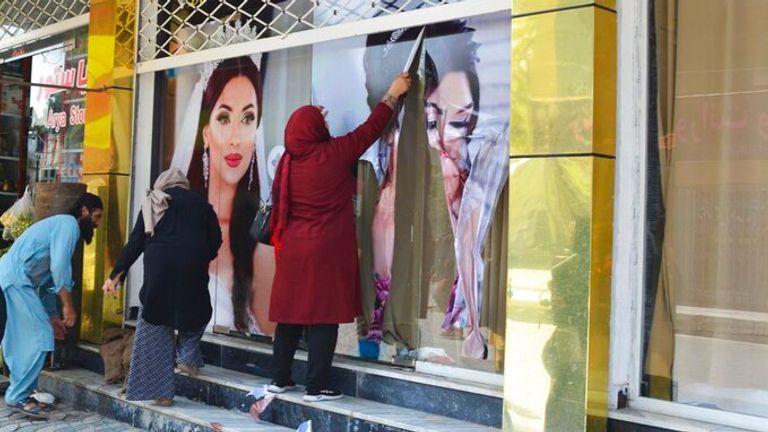
Pic: AP
The salon owner is the main breadwinner for her family and said it didn’t make sense to shut salons because they operate behind closed doors and are a vital part of the economy.
She correctly pointed out that not allowing women to finish their higher education, run businesses, or progress in society would have a profound long-term impact on the economy.
I’ve tried to get in touch with her since this latest edict was published, but I’ve yet to make contact.
For now, I can only assume the salon we stepped into has now been shut down.
Every day since foreign troops left Afghanistan, life has become worse and worse for women and girls.
The younger generation, many of whom only knew life under the 20-year NATO command, are a tech-savvy group who – in Kabul especially – are not used to not having their freedoms.
‘I just want to live’
Last month, the United Nations published a report detailing just how much those freedoms have been curbed.
“In Afghanistan today, girls and women are denied education beyond primary level, banned from working outside the home in most sectors, prohibited from accessing public baths, parks, and gyms, and moving freely around the country,” the report stated.
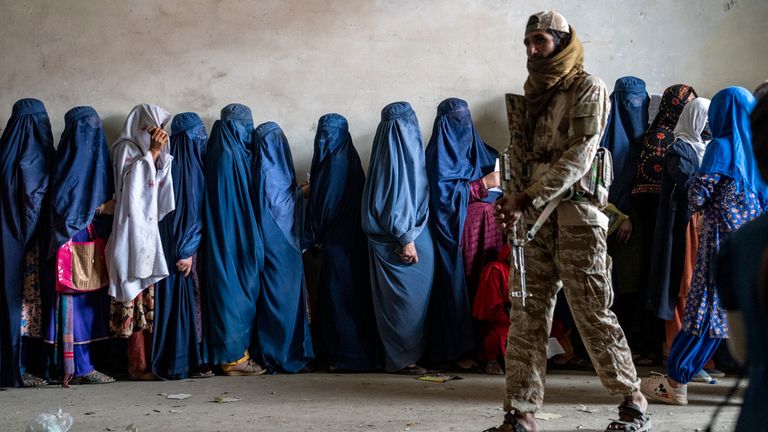
The Taliban have massively rowed back on the freedom of women and girls. Pic: AP
It found that the Taliban has “severely restricted the rights of women and girls and suffocated every dimension of their lives”.
And that is how many women feel: suffocated and invisible.
I still often receive messages like “nobody hears us”, “I need to get out of this scary and dangerous place,” and “I just want to live”.
There are clear divisions within the Taliban, we found that when we were last in Afghanistan.
The younger generation of leadership realise that if they want to be allowed back at the international table they will have to give women and girls their rights back.
But it would appear from the latest order that the old guard are still holding sway.
It may seem like frippery to mourn the loss of beauty salons, but when every other right and freedom has already been taken away, the loss of one of your last remaining safe havens is another huge blow.


